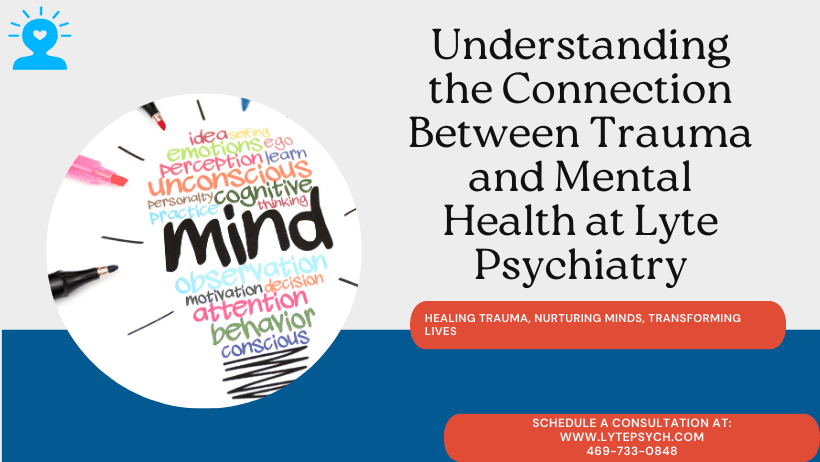Mon Jul 15 2024
Understanding the Connection Between Trauma and Mental Health at Lyte Psychiatry (Affordable Therapist and Psychiatrist Near You), Best Adults & Adolescents Psychiatrist and Therapist Near You, Dallas, Fort Worth, TX

Understanding the Connection Between Trauma and Mental Health at Lyte Psychiatry (Affordable Therapist and Psychiatrist Near You) Dallas, TX
Trauma is a profound experience that can leave lasting impacts on an individual's mental health. At Lyte Psychiatry, we recognize the importance of understanding the intricate relationship between trauma and mental health to provide comprehensive care and support to our patients.
What is Trauma?
Trauma is an emotional response to an event or series of events that are deeply distressing or disturbing. These events can include, but are not limited to, physical or sexual abuse, accidents, natural disasters, and loss of loved ones. Trauma can also stem from chronic experiences such as ongoing neglect, discrimination, or bullying.
The Impact of Trauma on Mental Health
Trauma can significantly affect an individual’s mental health, leading to a variety of emotional, psychological, and physical symptoms. Some common mental health issues associated with trauma include:
Post-Traumatic Stress Disorder (PTSD): Characterized by intense, disturbing thoughts and feelings related to their traumatic experience that last long after the event has ended.
Anxiety Disorders: Trauma can lead to chronic anxiety, panic attacks, and various phobias.
Substance Abuse: Some people turn to alcohol or drugs as a way to cope with the pain of their traumatic experiences.
How Lyte Psychiatry Can Help
At Lyte Psychiatry, we offer a range of evidence-based treatments to help individuals heal from trauma and manage its impact on their mental health. Our approach is personalized to meet the unique needs of each patient, and may include:
Therapy:
Various forms of therapy, such as Cognitive Behavioral Therapy (CBT), Eye Movement Desensitization and Reprocessing (EMDR), and trauma-focused therapy, are used to help patients process and cope with their traumatic experiences.
Medication:
In some cases, medication may be prescribed to help manage symptoms of depression, anxiety, or PTSD.
Holistic Approaches:
The Importance of Seeking Help
If you or a loved one has experienced trauma and is struggling with mental health symptoms, it’s important to seek professional help. Early intervention can prevent symptoms from worsening and improve the quality of life.
Schedule an appointment at Lyte Psychiatry (Best Adults and Adolescents Therapist and Psychiatrist Near You)
At Lyte Psychiatry, our compassionate team is dedicated to providing the highest level of care to help our patients heal and thrive.
To Schedule an appointment. Click Here
To see our services. Click Here
Call us if you have questions at 469-733-0848
FAQs:
Q: What are the signs that trauma is affecting my mental health?
A: Common signs include persistent anxiety, depression, flashbacks, nightmares, avoidance of reminders of the trauma, and difficulty functioning in daily life.
Q: How long does treatment for trauma-related mental health issues take?
A: The duration of treatment varies depending on the individual and the severity of their symptoms. Some people may see improvement in a few months, while others may need longer-term support.
Q: Can trauma affect children differently than adults?
A: Yes, trauma can impact children differently, often leading to changes in behavior, development, and emotional regulation. It’s important for children to receive specialized care tailored to their developmental needs.
Q: Is it possible to fully recover from trauma?
A: While the effects of trauma can be long-lasting, many people can achieve significant improvement and lead fulfilling lives with appropriate treatment and support.
Q: How do I know if I need professional help for trauma?
A: If you are experiencing intense, prolonged symptoms that interfere with your daily life and well-being, it’s important to seek professional help. A mental health professional can provide a thorough assessment and recommend appropriate treatment.